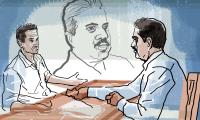Chairman of the Jammu and Kashmir Liberation Front Yasin Malik condemned the serial bomb blasts in Mumbai and Srinagar on 7/11, terming it an attempt to derail the ongoing peace process, and called on Prime Minister Manmohan Singh and Pakistan President Pervez Musharraf "to show restraint so that the peace process will not get derailed."
The former militant turned peacenik, who has been an integral part of the ongoing peace process between the two nations, said if the terrorist strikes managed to derail the peace process, it would be "a victory for the terrorists, who are working against peace."
Malik, now in the US recuperating from ear surgery, said he is convinced Al Qaeda has not infiltrated the Kashmir Valley.
"I condemn this brutal, inhumane act, because these kinds of acts have no place in any kind of religion or in any kind of civilised society," Malik told rediff.com.
"After this incident, there was some kind of tension, but thank God there were no communal clashes. The people of Mumbai have to get the credit for this, that nothing happened.
"This is the time for both heads of state to show restraint, and I welcome the statement by the Pakistan president that his government is ready to help India with the investigations," he said.
Malik pointed out that the attack had been condemned by every militant group operating in Jammu and Kashmir, and said the incident needed to be probed by "some impartial human rights group.
"Whenever these kinds of incidents happen, everybody condemns it, but until now we have not found out who did these civilian killings. It has become a blame game, with the result that we have failed to stop these kinds of incidents," he said.
Asked whether Dr Singh's suggestion that the Lashkar-e-Tayiba, backed by Pakistan's Inter-Services Intelligence, had masterminded the blasts, Malik said he did not wish to give offense to the Indian government and would therefore prefer not to answer.
On the subject of Al Qaeda's infiltration of Kashmir, Malik was more vocal. "Until now, there was no Al Qaeda type of group working in Kashmir, not in the last 16 years. And now, suddenly, somebody is calling it Al Qaeda. I do not believe in this. I can say with confidence, because I am living there, I move around in every village, and I don't think Al Qaeda is working in Kashmir. This claim lacks any credibility," he said.
He believes the uptick in violence, in recent months, is a deliberate attempt to sabotage the peace process. "The level of militancy has been increasing in the last two months, and that is because for the last one-and-a-half years, the peace process was going on and it had raised some kind of hope, and also provided some CBMs (confidence building measures)."
Malik said that it was not enough for the governments of the two countries to be engaged in dialogue. "If we fail to engage the militant leadership, then we are committing a great blunder; because if we keep them outside, that is not good for the peace process."
Malik said he had made this point to Dr Singh in course of a meeting in February. "He did not react, positively or negatively -- he was just taking points and listening patiently.
"I also said to him, and also to President Musharraf, that the CBMs have definitely provided the oxygen to this peace process, they have raised hope that the issue will be resolved, but what is lacking is the psychological perspective.
"The Kashmiri people hear these decisions through the radio, through the television and in the newspapers, and they feel they are not part of these CBMs' decisions. They need to be a part of the decision-making process," Malik stressed.
He believes that both leaders are fully committed to the peace process. "Prime Minister Manmohan Singh personally is a very honest person, and he has that kind of image; on the other side, the president of Pakistan is a brave man.
"But the issue is very serious, and it is not just a question of how honest you are in trying to solve it. It needs also the determination and will, and taking into account the local compulsions, the people of India. So let us see -- time is the best judge," he added.








